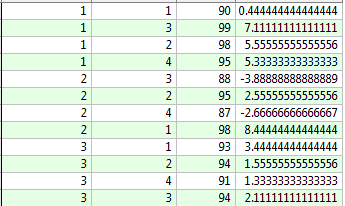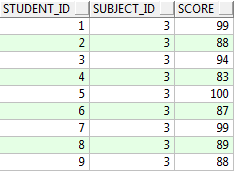oracle中显示窗口,Oracle中的窗口函数
在工作的过程中,我们有时候需要编写复杂的sql脚本.在这个时候,如果掌握一些数据库函数,对我们的工作可以事半功倍的作用. 这篇主要记录学习Oracle 的窗口函数的一些体会.
窗口函数的名字是over()函数,常用的有两个属性partition by和order by,partition by类似于group by,我们通常将group by叫做分组,而partition by称作分区,分组返回通常是一行,partition by返回的是多行。
窗口函数的威力是与其他函数联合使用,窗口函数主要和统计函数,排名函数,错行的函数联合使用.
1.和统计函数(max,min,avg,sum等)连用.比如现在有一个简单的例子,查询每个同学单科成绩和班级相应单科成绩的差值.结果是这样,张三语文+1,张三数学-1.代表了张三语文比班级语文均分高一分,数学成绩比班级均分少一分.这是一个简单的需求.测试数据如下
我们可以使用传统的group by 来查出每门功课的平均分,然后查出差值,sql脚本如下
select t1.*, (t1.score - t3.avgs) as gaps
from test_student_score t1,
(select t2.subject_id, avg(t2.score) as avgs
from test_student_score t2
group by t2.subject_id) t3
where t1.subject_id = t3.subject_id;
如果是使用over 窗口函数,这个sql就变成了一行代码,如下
select t.*,
(t.score-avg(t.score) over( partition by t.subject_id)) as gaps
from test_student_score t
上面两句脚本都得到如下结果
2.和排名函数(rank,dense_rank)连用.先说明连个函数的意义:rank是不连续排名函数(1,1,3,3,5),dense_rank 是连续排名函数(1,1,2,2,3).
例:查出科目3 各同学成绩排名情况
2.1使用不连续排名rank()
select t.*, rank() over(order by t.score desc) as ranks
from test_student_score t
where t.subject_id = 3;
得到的结果
2.2使用连续排名dense_rank()
select t.*, dense_rank() over(order by t.score desc) as ranks
from test_student_score t
where t.subject_id = 3;
果如下
3.和错行函数(lag,lead)联合使用.lag上几行,lead 下几行
/*语法*/
lag(exp_str,offset,defval) over()
Lead(exp_str,offset,defval) over()
--exp_str要取的列
--offset取偏移后的第几行数据
--defval:没有符合条件的默认值
试数据
select * from test_student_score t where t.subject_id = 3;
查上一行和下一行数据
select t.subject_id,
t.subject_id,
lag(t.score, 1, -1) over(order by t.score) as lags,
t.score,
lead(t.score, 1, -1) over(order by t.score) as leads
from test_student_score t
where t.subject_id = 3;
以上就是Oracle 窗口函数的几个简单的应用.






